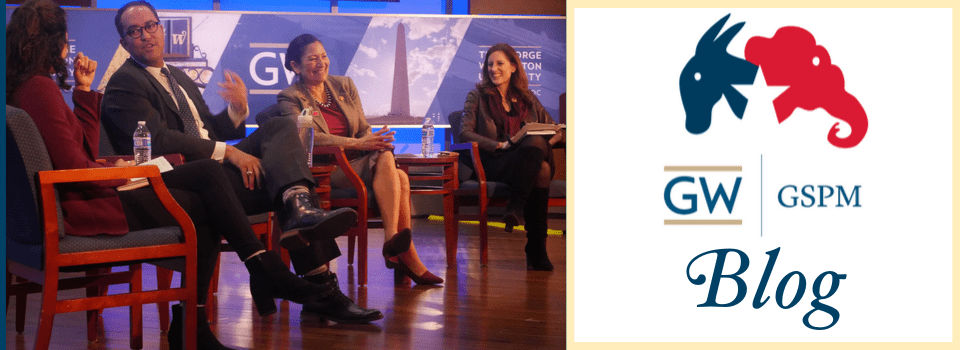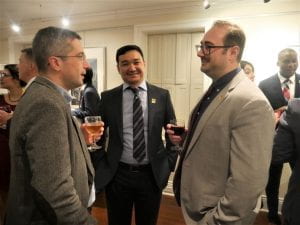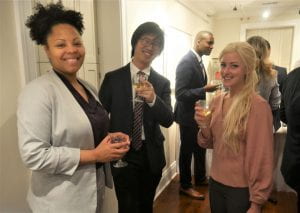Never give in—never, never, never—in nothing great or small, large or petty.
-Winston Churchill, speech on 29 October 1941
As one of its elective programs, available to all students seeking master’s degrees or certificates, GSPM offers several Global Perspective Residencies per year to provide an opportunity to learn about governance, advocacy, and social change around the world. In addition to coursework, Residencies include one immersion week abroad. The goal is to empower and prepare political professionals for success and leadership in engagement in foreign environments and relations with international counterparts.
Since March, the US and our university are operating in crisis mode. Under lockdown measures, domestic travel is restricted, while international travel is still inconceivable. The United Nations World Trade Organization (UNWTO) estimates the decline of travel and tourism by 22 percent in the first quarter of this year and expects a 58 to 78 percent decrease in international tourist arrivals in 2020, depending on the speed of the containment of the virus, the duration of travel restrictions, and shutdown of borders.
Does this mean that we should stop studying the world and resort to parochial perspectives, giving up the global ones? GSPM’s answer is the firm “never, never, never”! Learning persists, and the global scope of the current health and economic emergency is a telling reminder about the need to go beyond understanding and changing US politics. If we want to mitigate the current crisis and prevent another one, we must develop cultural and political sensitivity to the challenges of other countries, enhance mutual understanding and solidarity, strengthen cooperation, and develop together solutions to global problems.
Given the intensity of the current unprecedented calamity and an unpredictable pathway out of it, global leaders must reimagine the future and conceive a “new normal.” At GSPM, we must reimagine our courses and programs, increase their flexibility, and be both adaptive and innovative.
In the spirit of resolve, perseverance, and resourcefulness, we have not allowed the travel suspension to bring the Global Residencies Program to a standstill. In the words of a Greek Stoic philosopher, Epictetus, “We cannot choose our external circumstances, but we can always choose how we respond to them.” And we have responded by going virtual.
A Course and Program on the Republic of Georgia
Those students and faculty members who attended the reception at the Embassy of Georgia to the United States last November should remember the excitement about the prospect of having a course on the Republic of Georgia – a strategically important country where Europe meets Asia, beautiful mountainous land with rich history and culture, and a democratic frontrunner among the Caucasus nations and their neighbors. Hosted by H.E. Ambassador David Bakradze, the reception featured our partnership with the leaders of Georgian civil society – Sector 3 – Hub for Development, Center for Development and Democracy, and Endowment “ProDemos” – and also introduced us to hospitable and generous Georgian people as well as vintage Georgian wines and exquisite food.
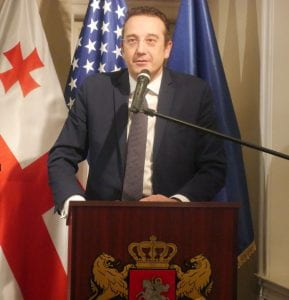
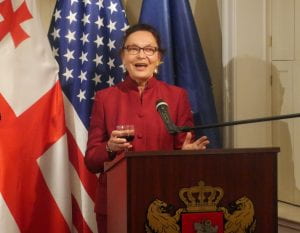
GSPM Global Residencies Director
You can imagine the disappointment of the applicants to the Global Residencies Program in Georgia when coronavirus arrived, destroying our much-anticipated visit to Tbilisi in early May. Nevertheless, we went ahead with the course and reconceived the face-to-face residency as an online program. True, there was some anxiety about whether this option would work, especially given the eight-hour time difference between DC and Tbilisi, but this virtual option did work! Below are the testimonies of some of our students:
I have really enjoyed the course; it has been so informative, and it has been much easier to stay focused [during the online program] than I had feared. Devon Murphy, Legislative Affairs.
[I appreciate] bringing such distinguished and experienced individuals to present at the class and for enthusiasm and commitment in making this virtual program a great success. Anna-Maija Mattila-Litvak, Strategic and Public Relations.
Open and extensive discussions with [Georgian] high-ranking politicians, administration officials, and diplomats were of unique value for us. Gary Crone, Global Public Relations.
Thanks to our invaluable partners in Georgia, the virtual program attracted excellent speakers and ensured informal and frank, off-the-record, interactions, following the Chatham House rule.
We were deeply impressed by the thoughtfulness, enthusiasm, commitment, and receptivity of the political leaders of Georgia who participated in the program: Archil Talakvadze, Speaker of the Parliament of Georgia; Kakha Kuchava, Deputy Speaker of the Parliament of Georgia; Levan Davitashvili, Minister of Environmental Protection and Agriculture; and Mariam Kvirishvili, Head of the Tourism Administration. Despite their youth (all in their thirties), they already have many achievements under their belts and were eager to share with us their successes as well as challenges.
We also could sense first-hand the vibrancy of Georgian civil society while holding exchanges with Lela Akiashvili, Prime Minister’s Advisor on Human Rights and Gender Equality; Tornike Zirakishvili, Deputy CEO of Enterprise Georgia; Ketevan Chachava, Chairwoman of Sector 3 - Hub for Development; Luka Kurdgelia, Programs Director of Endowment ProDemos Foundation; and Margalita Shakarashvili, who is associated with both Sector 3 and the Heritage Foundation, to name just a few speakers and panelists. The discussions with H.E. Ambassador David Bakradze and Giorgi Tsikolia, Deputy Chief of Mission at the Embassy of Georgia to the US, were also most useful.
All participants in the program expressed a profound interest in reinforcing ties between the United States and the Republic of Georgia and support for Georgia’s aspirations for freedom and prosperity as part of the community of democratically-minded countries. Envisioning the return to normalcy after the coronavirus pandemic, Ambassador Bakradze invited us to the traditional Georgian feast at Supra in DC. It is still unclear when we will be able to accept this kind invitation, but we will certainly have a chance in the future to raise traditional Georgian toasts for the families, our countries, friendship, love, and peace.
As part of the communication campaign launched by our Georgian partners, the online program was profiled by the Voice of America’s Georgian division. Ketevan Chachava, Chairwoman of Sector 3 - Hub for Development, also interviewed me for the new podcast of her organization. I was honored to be the first speaker on this podcast. The second speaker was Ambassador Bakradze. I am happy that GSPM is in such good company! 
Forthcoming Global Concentration Courses and Programs
Global Perspective E-Residency: European Union, Fall 2020
Building on the approaches tested during the virtual program on Georgia, the fall semester schedule will include a Global Perspective Program on the European Union (EU). You may know that in the interest of students’ safety and wellbeing, GWU has suspended studies abroad until at least January 2021. Therefore, we will again go virtual while not sacrificing the rich content the Residencies offer.
The course will familiarize students with EU history, political institutions, and programs; the agreements and clashes among the EU member states; and EU foreign and security policy. It will aim at developing students’ critical thinking and forward-looking skills in analyzing the EU stakeholders and trends as well as the dynamic relationship among governing, legislative/policy, electoral, and cultural/media environments within the EU. Students will be expected to complete the course with a concrete product – a Strategy Brief on political engagement between the US and the EU and within EU member states on the topic of one’s choice and related to a chosen (or aspired) career path.
The online program will provide an insiders’ view on the EU and thus help students understand the objectives and priorities as well as challenges and opportunities of the organization, advance knowledge of the employed strategies and policies, and assist in evaluating their effectiveness. The sessions will feature staff of the Delegation of the European Union to the United States, counselors of the DC-based embassies of the EU member states, and US experts on relations with the EU and will be complemented by virtual bridges with the EU headquarters in Brussels (including both the European Commission and the European Parliament) as well as the capitals of the key EU member states. Although we will not be able to visit Brussels physically, we will have a chance to experience the EU’s spirit, ambitions, hopes, and practices virtually.
Comparative Political Management Environments, Fall 2020
Although this 14-week course is offered to all GSPM students, it is especially useful for those who have chosen a Global Concentration. It also serves as good preparation for all students for participation in the Global Perspective Residencies courses.
Students will gain a conceptual and practical understanding of the political management environments and the workings of political institutions in a variety of countries. They will also develop an ability to compare these environments and institutions—highlighting comparative advantages and disadvantages—via readings, written assignments, PPT and video presentations, and participation in debates and negotiations.
The classes on general concepts—such as states and nations, democratic and nondemocratic regimes, the developing world, and international organizations and globalization—will be illustrated by country cases and will be alternating with role-playing sessions. Students will assume the roles of “Ambassadors to the UN” and “UN Advisers” to both present political systems of “their countries” and offer rebuttals to the messages of “country delegates.” The course will feature some guest speakers and will culminate in a Model UN simulation focused on the management of the coronavirus pandemic around the world.
Throughout the course, students will practice and thus sharpen their evidence-collection, analytical, presentation, negotiation, advocacy, and assessment skills. By translating their intellectual inquiries into recommendations for practical actions and measures, they will also strengthen their proficiencies in strategic decision-making and consensus-building.
Global Perspective Residency: Strategy and Statecraft in Churchill's London and Today’s Great Britain, Spring 2021
It is not accidental that a quote from Winston Churchill serves as an epigraph to this blog. British Prime Minister was a master of crisis communication, and his messages about the tenacity and overcoming in a “finest hour” resonate during the current health and economic emergency. The reference to Churchill’s present-day relevance is also pertinent because we will be partnering with the International Churchill Society (ICS) to offer our Global Perspectives Residency program in London in March 2021.
The December 2019 London Residency, which serendipitously overlapped with the parliamentary election, provided a unique exposure of GSPM students to influential national and global leaders abroad. The highlights of the program – developed in cooperation with ICS – included the meetings at the Royal United Services Institute (RUSI) for Defense and Security Studies, the Foreign Policy Centre, and the UK Ministry of Defense; exchanges with members of the House of Lords, Lord David Owen and Lord Howard of Lympne; visits to several public affairs and government relations firms; and a private tour of the Churchill War Rooms.
With expected sponsorship by the International Churchill Society, the March 2021 program seeks to attract an even more illustrious group of speakers from the UK parliament, prime minister’s office, ministries, and think tanks of strategic importance. In addition, the online pre-travel portion of the course will provide students with unique insights into Churchill's life and leadership, his place in history and the continuing relevance of his statesmanship today, combined with extensive readings about contemporary issues in politics, government, economics, and other fields in Britain. Learning about strategy and statecraft on the scene in Churchill’s London, students will also develop their analytical judgment and communication skills. These skills are essential for inspiring leadership and perseverance during crises as well as in more stable and fortunate times. So, please consider joining!
For questions about the Global Residencies Program and the Global Concentration classes, please contact Dr. Natalia Dinello, ndinello@gwu.edu, or Ms. Charlsie King, charlsieking@gwu.edu.
Dr. Natalia Dinello is the director of the Global Residencies Program at the George Washington University Graduate School of Political Management. Dr. Dinello can be reached via email at ndinello@gwu.edu.
